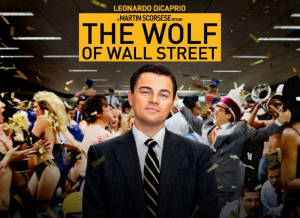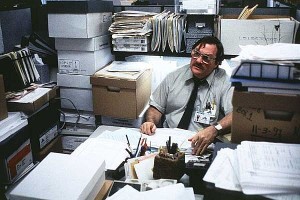THE WOLF OF WALL STREET: 4 STARS. “almost as excessive as Balfort’s $26,000 dinners.”
 Hunter S. Thompson, the great gonzo journalist and observer of American life, had nothing to do with “The Wolf of Wall Street,” but he certainly is one of the film’s spiritual fathers.
Hunter S. Thompson, the great gonzo journalist and observer of American life, had nothing to do with “The Wolf of Wall Street,” but he certainly is one of the film’s spiritual fathers.
Directed by Martin Scorsese and based on the life of hard-partying Wall Street tycoon Jordan Belfort, it is a depraved opera about sex, drugs and greed. It’s the kind of epic story of avarice and excess Thompson would have relished, but are audiences ready for a three-hour drug fuelled romp through the wild side of Wall Street?
When we first meet Belfort (Leonardo DiCaprio) he has yet to occupy Wall Street. An ambitious newbie, his first day as a broker is Black Monday, October 19, 1987, the date of the biggest crash since the Depression. Forced to reinvent himself he forms a shady company specializing in penny stocks that do little for his clients, but line his pockets with commissions.
With money rolling in Balfort and company (including Jonah Hill as Quaalude enthusiast Donnie Azoff) dive head first into Wall Street’s cocaine and hookers era, forming a brokerage firm with the upstanding name of Stratton Oakmont. “Stratton Oakmont is America,” says Balfort. “It’s the land of opportunity.”
Equating success with excess, Balfort indulges in every debauchery while making everyone around him rich (and himself richer than everyone else) and fending off attention from the FBI.
By the end of “The Wolf of Wall Street” you’ll feel as though you’ve had testosterone splashed on your face. From the film’s opening scenes of DiCaprio and Co. throwing helmeted little people at a giant Velcro target to a wild soon-to-be-classic Quaalude scene, Scorsese has crafted a film that makes Gordon Gekko look warm and fuzzy. It’s muscular filmmaking that takes no prisoners, highlighting unlikeable mostly male characters in dubious situations.
There are female characters. As Belfort ‘s second wife Naomi Margot Robbie does good work, but the movie is a boy’s club. Or rather, a frat house where the Bro Code relegates women to the bedroom or the barroom but rarely the boardroom.
The sexual politics are definitely slanted in toward the males, but the movie shines as a metaphor for all the venal men whose gluttonous appetites for power and wealth ground the US economy into the dirt over the last few decades. Scorsese captures the unhinged spirit of these men, luxuriating in the decadent details of their lives.
It makes for entertaining viewing, mostly because DiCaprio and Jonah Hill are able to ride the line between the outrageous comedy on display and the human drama that takes over the movie’s final minutes. Both are terrific, buoyed by the throbbing pulse of Scorsese’s camera.
With its fourth wall breaking narration, scandalous set pieces and absurd antics “The Wolf of Wall Street” is an experience. At three hours it’s almost as excessive as Balfort’s $26,000 dinners. It feels a bit long, but like the spoiled brats it portrays, it will not, and cannot, be ignored.

